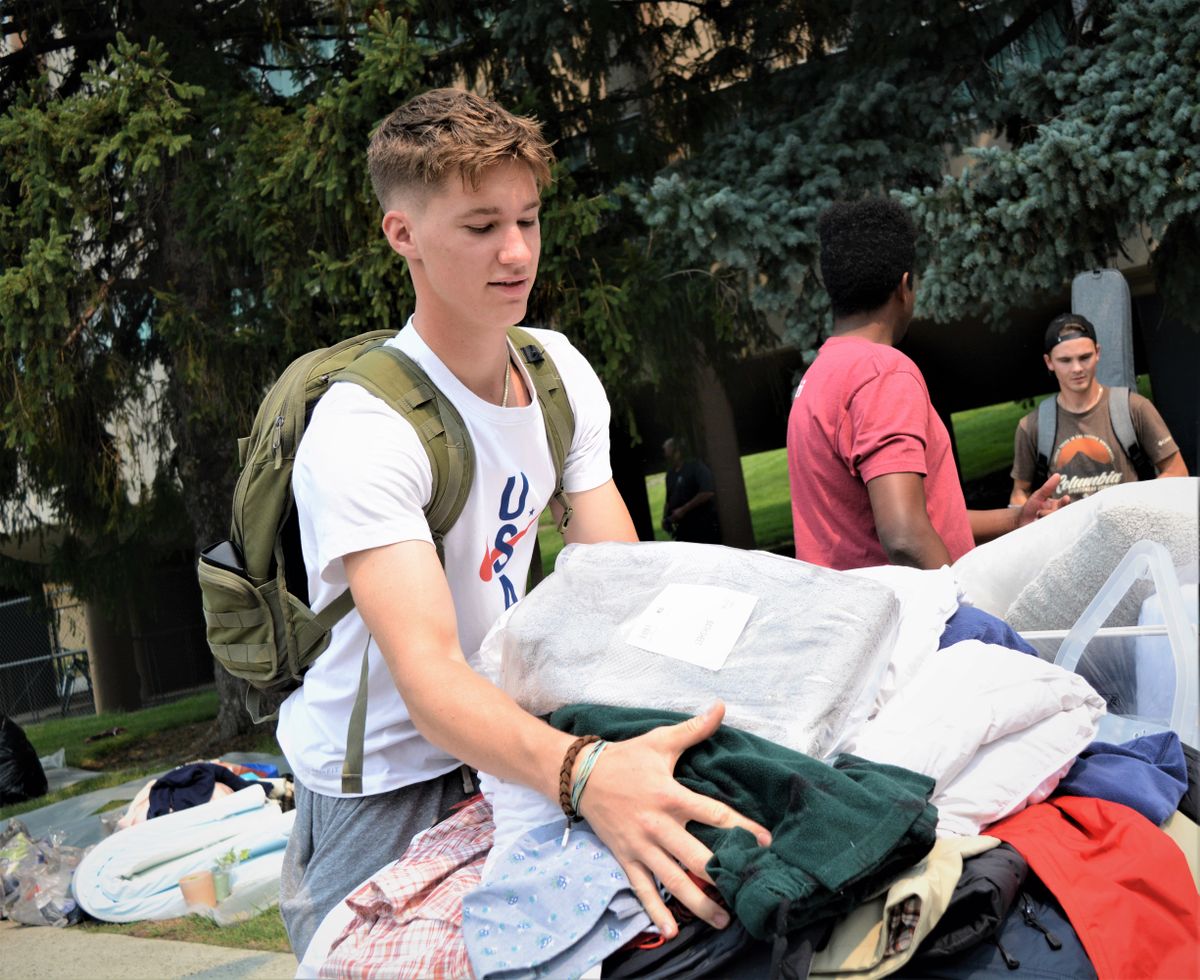‘Rebuild this campus experience’: As COVID-19 lingers, WSU moves in first wave of Pullman students for the new year

PULLMAN – Tyler Suter is hopeful his freshman year at Washington State University is a bit more grounded than his senior year in high school.
The Lynnwood, Washington resident recalled how his last year at Meadowdale High School was done in hybrid fashion, which was “super all over the place.”
“Hopefully with full in person, I can get a full curriculum in so I can study well and do ‘actual’ tests,” said Suter, who noted he “didn’t get nearly as much education” out of the hybrid model . “I want to experience different things, and not have like ‘half-experiences’ of different subjects because of hybrid learning.”
Suter was among the first students to move into on-campus housing at WSU this year – a school year university administrators hope will be a much more robust in-person experience than the last year and a half due to the COVID-19 pandemic.
He checked into Beasley Coliseum on Friday, the first day of WSU Pullman’s four-day move-in weekend. Donning a mask, Suter was given his CougarCard and room key during the process – which involved a verification of his vaccination status.
Brandon Brackett, director of residential communities, said he was expecting roughly 4,000 students to arrive by Monday, including approximately 800 registered to move in Friday.
Overall, Brackett said just under 5,000 students – all of the freshmen and a quarter of the sophomores – are expected to live on campus this year. That’s on par with previous years, said Brackett, who also noted the university was trending toward 6,000 students prior to the pandemic.
“We are spreading people out with move-in time slots so we don’t have 3,000 people all lined up for four hours waiting on a Saturday,” Brackett said. “We also made move-in earlier; we started on a Friday, which we’ve never done before.”
And while Friday kicked off an official welcome to campus for the freshman, the same could be said for the arriving sophomores. Brackett said residence halls last year were initially limited to 700 students, which was bumped up to approximately 1,300 students in January.
“Typically, we have about a fifth of our population are people returning to the (residence) halls, and that population’s actually grown over the last few years,” he said, “but this year, it’s all people brand new to campus. It’s a different dynamic, but also pretty exciting.”
To make up for lost time, WSU housing administrators took measures at the residence halls to prioritize giving returning sophomores the college living experience that they didn’t get last year.
That includes sophomore-only floors and areas, as well as programming focused on topics more tailored to typical second-year challenges, such as declaring majors, interacting with faculty and finding internships or studying aboard.
“For our second-year students, they’ve spent a year being a college student,” said Jessie George, a residential education director, “so it is focusing a little bit more on how do you hone those skills and how do you reflect on what that first year was so you can continue to grow as a student and a person.”
With COVID-19 cases on the rise across the state, WSU moved up the deadline for students to submit their vaccine or waiver information from November to Sept. 10.
For students, one of the available waivers – the personal/philosophical exemption – is set for abolishment once the Food and Drug Administration fully approves any one of the Pfizer, Moderna or Johnson & Johnson vaccines. Religious and medical exemptions will still be allowed.
“I think because of the experience we had, folks understand what it was like to not have that traditional experience, and I think there’s very much a hunger to not have to repeat that,” George said. “Just that in and of itself is going to help inspire students to really hunker down and make sure we’re keeping our entire community safe.”
As of Friday, Whitman County – like most counties across Washington – was labelled an area of high viral transmission by the Centers for Disease Control and Prevention. And the school’s COVID activity last school year had President Kirk Schulz and other campus officials warning students that their behavior “needs to stop.”
“We’re already a high transmission county, and the students haven’t come up yet,” Brackett said. “I think students got kind of a bad rap last year. Were there students that weren’t following what we asked them to do for COVID? Sure, but there were plenty of adults that were doing the same.”
Suter said he’s only “a little bit concerned” with COVID-19 due to the delta variant.
“As apparent today, there’s bad air quality because of wildfires, so that’s another concern,” he said Friday, a day that saw Pullman’s air hit “unhealthy” levels on the U.S. Air Quality Index. “But besides that, I think it’ll be a good experience, nonetheless of those problems.”
Brackett said he is confident the university “can have a safe and amazing year.”
“We work here because we love this place and we love the experience that we can offer students, and it was a shadow of itself last year. We went from trying to bring people together to trying to split people apart, which is a huge shift,” Brackett said. “They’re going to be embraced by this Cougar family as we rebuild this campus experience, and I think everybody here at WSU is pretty excited about that.”